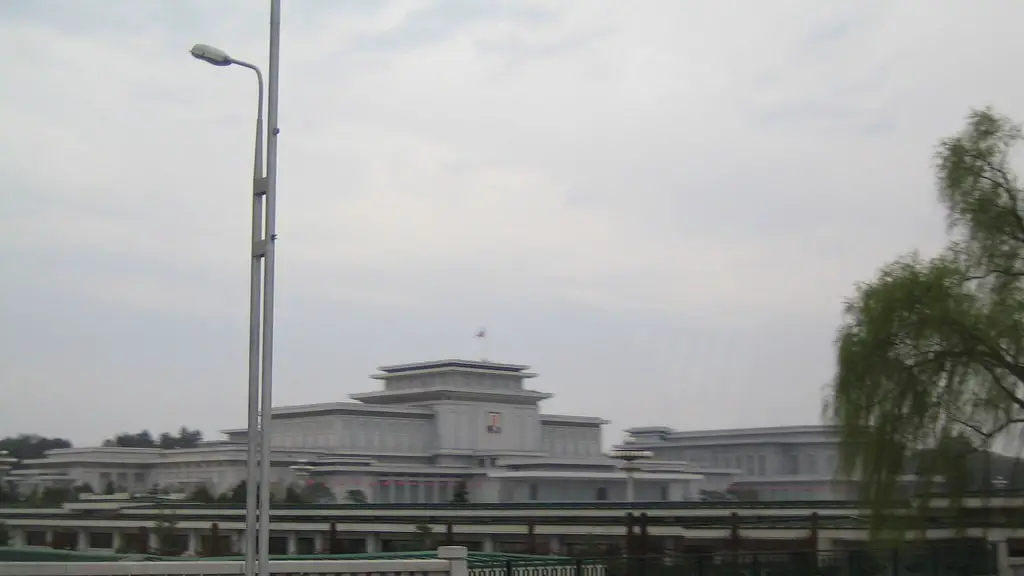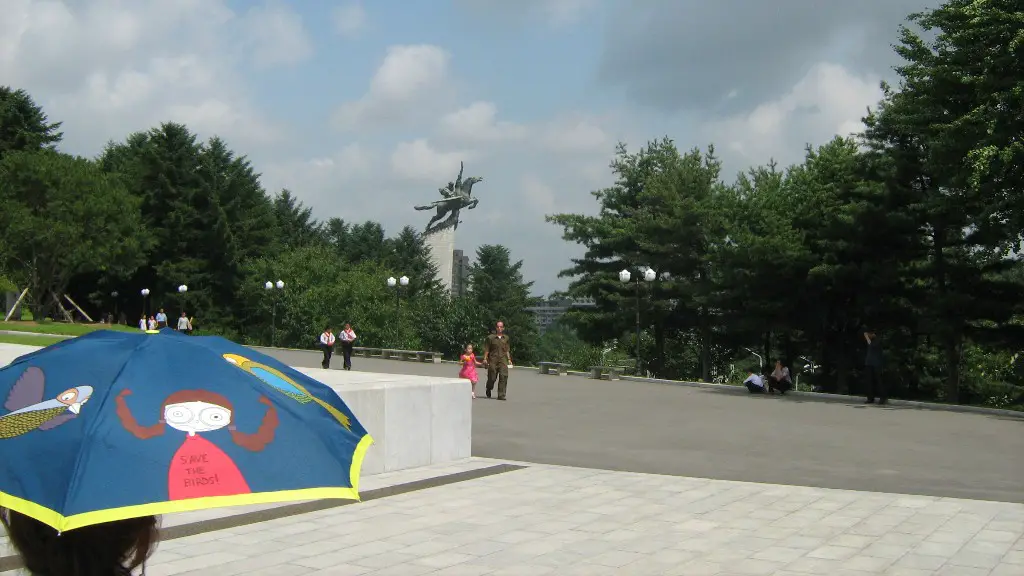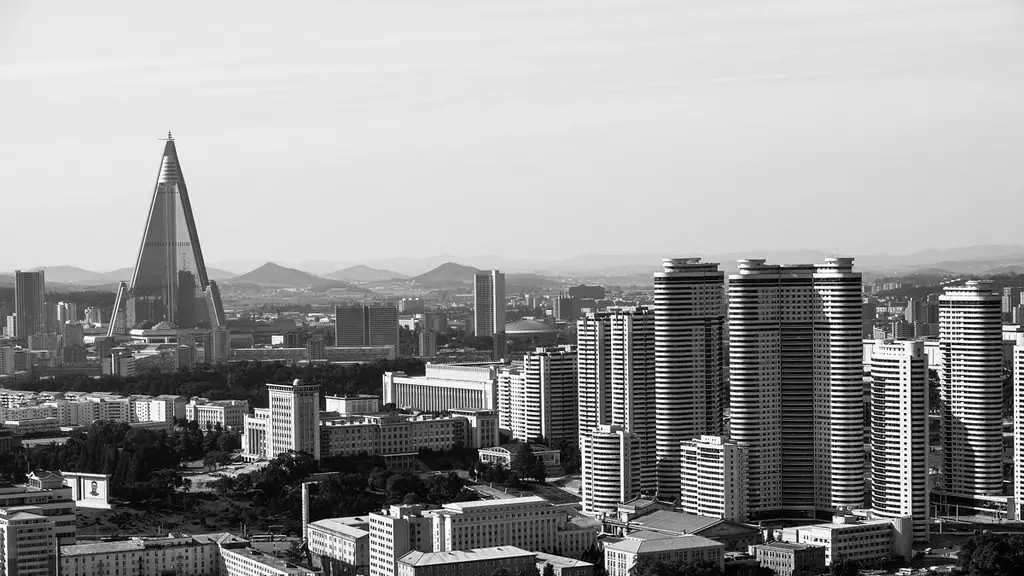Why Is North Korea Trying To Bomb Us?
The United States and North Korea have been locked in a hostile standoff for nearly a decade. It has been a long-time point of contention between the two nations, with tensions seemingly escalating to a fever pitch in recent years. The most urgent issue is North Korea’s threats to launch a nuclear attack on its adversaries, namely the United States. But why is North Korea trying to bomb us?
On the surface, North Korea’s regime appears to be a reclusive and isolated nation, hostile towards its neighbors, in particular the United States. Its volatility extends to its hostile relationship with the US and a number of other countries, and its track record of testing atomic bombs and ballistic missiles to demonstrate its military capabilities.
To understand why North Korea is attempting to bomb the United States, it is necessary to look beyond the rhetoric. The main reason for North Korea’s aggression toward the United States is the regime’s desire to maintain power. The regime has a long history of supporting repressive and oppressive policies toward its citizens, and for decades it has sought to consolidate its power through acts of brinkmanship.
North Korea’s current leader and head of state, Kim Jong Un, inherited his position of power from his father, Kim Jong Il, and has since become a formidable leader who continues to consolidate power through threats of nuclear force. A recent report by arms control experts suggested that Kim Jong Un’s strategy is to use fear and intimidation to ensure his regime’s security in the region and beyond.
In addition to its constant threats of launching a nuclear attack, North Korea has also demonstrated its willingness to undertake more conventional means of brinkmanship. It has repeatedly tested short, medium and long range missiles, as well as conducted cyber-attacks against international targets, including some in the United States.
North Korea’s aggressive behavior has also been attributed to its relative economic instability. Since the end of the Korean War, the country has experienced significant economic strain, which has only been compounded by external economic sanctions. In recent years, the country has become increasingly dependent on its nuclear program as a veneer of stability, raising the stakes of its brinksmanship.
At the core of the issue is North Korea’s desire to maintain power at any cost. From a psychological perspective, the regime’s track record of brinkmanship points to a deep-seated insecurity, which, combined with its economic instability, leads it to act out of desperation and fear.
International Reactions towards North Korea
In the face of North Korea’s threats, the international community has responded with condemnation and sanctions. Most recently, the United Nations Security Council unanimously voted to impose the strongest sanctions yet against North Korea, in an effort to dissuade the regime from following through on its threats. Furthermore, many countries, including the United States, have sought to increase diplomatic efforts to dissuade North Korea from continuing its provocative behavior.
For its part, the United States has also taken steps to improve its ballistic missile defense capabilities in order to better protect itself against a potential attack. President Trump has also been vocal in condemning North Korea’s threats and its nuclear program, while at the same time maintaining open channels of communication to ensure that an escalation of hostilities is avoided.
At the same time, other countries, such as South Korea and Japan, have also taken steps to bolster their defenses against a potential attack from the North. These countries have adopted their own sanctions against North Korea and have sought to increase collaboration with the United States and other allies to better mitigate the risk of war.
Moreover, other nations have sought to engage North Korea in diplomatic efforts to deescalate tensions. China, for example, has maintained direct contact with North Korea and has sought to use diplomatic means to encourage the regime to abandon its nuclear ambitions.
North Korea’s Growing Nuclear Arsenal
Despite the international response, North Korea’s nuclear weapons program has continued to progress. Estimates suggest that the regime currently has around 200 nuclear warheads and has conducted six nuclear tests since 2006. Experts have also suggested that North Korea is close to developing the capability to mount a nuclear warhead on a ballistic missile capable of reaching the United States.
Recent analysis of North Korea’s nuclear program suggests that the regime has also begun working on developing a miniaturized nuclear bomb, which could be mounted on its intercontinental ballistic missiles (ICBMs). This is of particular concern to the United States, as most of its major cities are within range of North Korea’s missiles.
The potential threat posed by North Korea is growing by the day, and in response the United States has continued to take steps to strengthen its defenses. The US has deployed a missile defense system in the region and has sought to increase collaboration with allies. It has also signaled that if North Korea were to launch an attack it would be met with overwhelming force.
At the same time, the US has also indicated its willingness to return to the negotiating table and to pursue diplomatic solutions to the standoff. To this end, President Trump has expressed openness to high-level talks with North Korean leader Kim Jong Un, while reiterating that any talks must be premised on the North Korean regime ending its nuclear weapons program.
Are Diplomatic Solutions Possible?
As the situation continues to escalate, the question remains: is it possible to peacefully resolve the conflict? A recent report by the International Crisis Group suggested that diplomatic options for resolving the current standoff are limited due to the deep-rooted distrust between the two sides.
A diplomatic solution may be possible, but it will require North Korea to make significant concessions. At the same time, the United States must be willing to make significant compromises as well, such as lifting economic sanctions, in order to reach a lasting peace agreement.
Conversely, some experts have suggested that military action against North Korea could be a viable option. This could take the form of a surgical airstrike against North Korea’s nuclear arsenal and missile sites, with the aim of crippling the regime’s ability to launch a nuclear attack. However, such a move would carry a significant risk of retaliation from North Korea, as well as potential collateral damage.
Ultimately, the only way to achieve a peaceful resolution to the current stand off is through diplomatic means. The United States and the international community must work together to find a way to encourage North Korea to pursue a more moderate path and to abandon its nuclear ambitions. Only then can a lasting peace be achieved in the region.
Impact of International Sanctions on North Korea
The United Nations Security Council has voted overwhelmingly to institute a slew of economic sanctions against North Korea, in a bid to increase pressure on the regime and to restrict its nuclear weapons program. These economic sanctions are intended to restrict the country’s access to foreign currency, technology, and trade, as well as to further limit its access to the international banking system.
The impact of these sanctions on the North Korean economy has been significant, resulting in an estimated 18% contraction in 2016 alone. The sanctions have restricted North Korea’s access to foreign currency and have forced it to rely heavily on its own resources, such as coal and other domestic commodities.
The adverse effects of the sanctions have been especially pronounced in the health sector. According to a recent report by the United Nations, the lack of access to foreign currency has resulted in a shortage of medical supplies and a deterioration in the quality of healthcare in the country. This has resulted in an increase in rates of infectious diseases, malnutrition and infant mortality.
The economic pressure created by international sanctions has also caused significant strain on the North Korean regime, leading some to suggest that it might be willing to make significant concessions in order to avoid total economic collapse. The President of the United States has expressed optimism that a diplomatic solution is possible, provided that North Korea is willing to negotiate in good faith.
What is the Future of U.S.-North Korea Relations?
At this point, it is difficult to predict what the future may hold for U.S.-North Korea relations. It is clear that the current situation is untenable and that a diplomatic solution is the only way to achieve lasting peace in the region. What remains to be seen is whether North Korea will be open to negotiations and whether the United States and the international community will be willing to make the necessary compromises.
One potential outcome is that North Korea will continue on its current path, eventually realizing that its nuclear arsenal does not bring the security it desires. This realization could prompt the regime to pursue a more moderate path, and to pursue a diplomatic resolution to its standoff with the West.
The alternative is that the deteriorating economic situation will cause further strain on the regime and eventually result in its collapse. This could open the door to unified Korean Peninsula, albeit one that faces a long and difficult road to economic and political recovery.
Regardless of the outcome, it is clear that the situation in North Korea is complicated and fraught with danger. It will take a concerted effort by the United States, its allies and the international community to reach a peaceful resolution to the current crisis. Only then can peace and stability be restored in the region.





